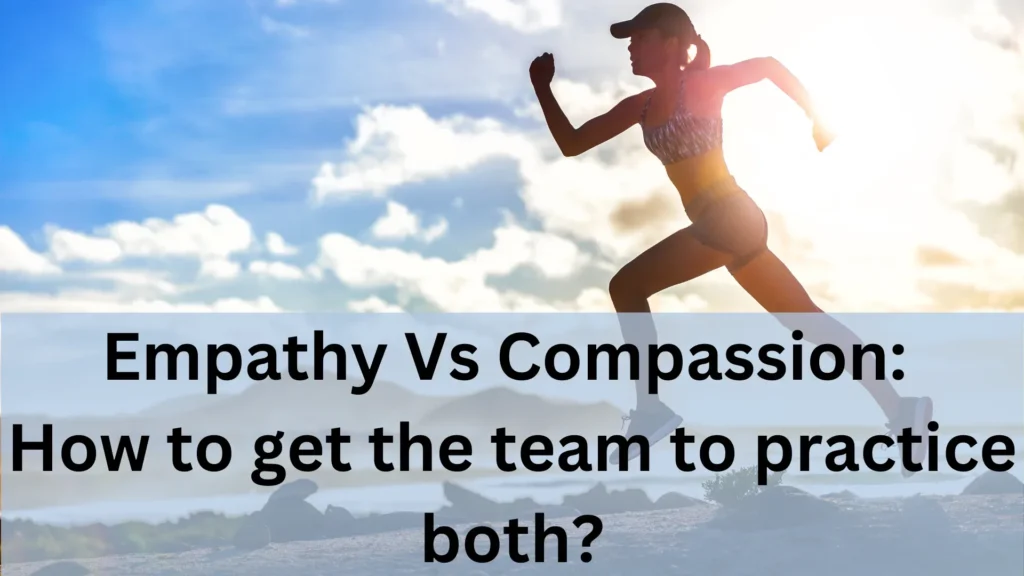
Hey sports fans and athletes!
Ever wondered about the roles of compassion and empathy in sports?
It’s more than just playing the game. It’s about understanding and supporting your teammates on a deeper level.
As a sports psychologist, I’ve seen firsthand how these emotional skills can make or break a team.
So, let’s dive into this fascinating topic, breaking down what compassion and empathy really mean in the world of sports, why they’re crucial, and how you can foster these qualities in your own team.
Trust me, it’s game-changing stuff.
What’s Compassion in Sports?
Let’s kick things off with compassion.
In the simplest terms, compassion is about noticing someone’s struggle and feeling motivated to help them out.
In sports, this could look like a seasoned player noticing a teammate struggling with their confidence and taking the time to mentor them.
Or consider a coach who recognizes the team’s exhaustion and decides to lighten the training load. It’s all about taking action to support others.
Think of compassion as that warm, fuzzy feeling that pushes you to do something good for someone else.
But in the sports universe, it’s like the secret sauce that makes a good team great.
It’s not just about noticing a teammate having a tough day and giving them a pat on the back. It’s about genuinely caring for them and stepping up to make a difference.
Picture this: You’re in the middle of a grueling practice, and you notice one of your teammates is lagging behind, looking totally wiped out.
Compassion is choosing to slow down, jog alongside them, and say, “Hey, you’ve got this. Let’s push through it together.” It’s about creating a vibe where everyone feels looked after, where it’s okay to be vulnerable because the team has your back.
Or imagine your team just lost a big game. Everyone’s spirits are in the dumpster.
Compassion is when one player stands up in the locker room and says, “We win together, we lose together. Let’s learn and move forward.”
It’s about lifting each other up, transforming those tough moments into stepping stones rather than stumbling blocks.
And hey, compassion isn’t just player to player.
Coaches play a massive role, too.
It’s the coach who takes the time to understand each player’s struggles, whether they’re on the field or off.
They’re the ones adjusting training schedules, offering extra help, or just lending an ear.
It’s about building a team culture where everyone feels valued and supported, not just as athletes but as people.
So yeah, compassion in sports?
It’s about more than just being nice. It’s about actively contributing to a team atmosphere where everyone feels empowered to give their best, knowing their teammates and coaches genuinely care. It’s pretty awesome when you think about it.

And Empathy? How’s That Different?
Empathy, on the other hand, is about feeling what another person is feeling.
Imagine you’re on the court, and you see your teammate miss a crucial shot.
If your stomach drops and you feel their disappointment as if it were your own, that’s empathy.
It doesn’t necessarily drive you to help, but it makes you understand and share their emotions.
It’s like when a whole team feels the sting of a loss together, or the shared euphoria of a last-minute win.
If compassion is the superhero taking action, empathy is its sidekick, the one with the superpower to really feel what others are feeling.
It’s like having an emotional x-ray vision.
Imagine you’re in the middle of a tough game. The pressure is intense, and one of your teammates messes up big time, costing you a crucial point.
If you’re feeling empathy, it’s not just about seeing their disappointment. It’s like you can feel that pit in their stomach as if it were your own.
This isn’t about blaming or getting frustrated. It’s about understanding on a deep, emotional level what they’re going through.
Empathy in sports is like the glue that holds the team together when things get rough.
It’s what happens when a player misses a penalty shot, and instead of groans and eye rolls, they’re met with high fives and “We’ll get the next one” encouragements.
It’s knowing that everyone has off days and that feeling of failure is something we all share at some point.
And it’s not just about the tough times, either.
Empathy lets you genuinely share in the joy of your teammate’s successes.
That buzzer-beater shot?
You feel the thrill just as much as if you were the one who made it.
It’s celebrating each other’s victories, big or small, because you know exactly how much work went into achieving them.
But here’s the cool part: empathy doesn’t just make you a better teammate. It also makes you a better competitor.
Understanding your opponents on a human level, recognizing their efforts and struggles, can actually boost your respect for the game and everyone who plays it.
It’s about fierce competition, sure, but it’s also about mutual respect and shared love for the sport.
So yeah, empathy is pretty powerful. It’s about feeling with your team, being in tune with their highs and lows, and supporting them not just because you should, but because you genuinely feel what they’re going through.
And when you’ve got a team that really gets each other on that level?
Man, that’s when the magic happens.
Why the Distinction Matters in Sports
Now, why fuss over the difference between compassion and empathy, especially in sports?
Because knowing the distinction helps teams and coaches create a more supportive, resilient environment.
Empathy lets us feel with our teammates, building strong bonds.
But without compassion, those feelings might not translate into supportive actions.
It’s one thing to share in your teammate’s disappointment. It’s another to actively help them overcome it.
That’s where real teamwork shines!
First off, understanding empathy and compassion as separate vibes can seriously up your team’s game.
Empathy’s your ability to feel the highs and lows right along with your teammates. It’s like when someone on your team is bummed about messing up a play, and you feel that gut punch too.
That shared emotional experience? It’s powerful stuff.
It makes you more than just a team; it makes you a tight-knit crew that really gets each other.
Now, flip the script to compassion. This is where you see someone struggling and think, “Man, I’ve gotta help.” It’s action time.
Maybe it’s giving some extra encouragement, sharing some tips, or just being there to listen.
Compassion moves you to lift each other up, to turn those tough moments into opportunities for growth and bonding.
Here’s the kicker: knowing the difference between feeling with someone (empathy) and wanting to help them get better (compassion) is a game-changer.
It matters because it can transform a group of individual athletes into a united front, a team that not only understands each other’s struggles but actively works to overcome them together.
In sports, this distinction is everything!
A team that masters both empathy and compassion is unstoppable.
Why?
Because they’ve got the emotional intelligence to not just connect with each other but to boost each other up, to turn challenges into comebacks.
It’s about creating a culture where everyone feels supported, understood, and empowered to give their best, both on and off the field.
So, why does distinguishing between compassion and empathy matter in sports?
Because it’s the secret sauce to building not just strong athletes, but strong teams.
Teams where everyone feels seen, heard, and motivated to pull together, no matter what.
And let’s be real, in the competitive world of sports, that’s the kind of team everyone wants to be a part of.

Boosting Empathy on Your Team
Want your team to be more empathetic?
Start with open conversations.
Encourage players to share their feelings and experiences.
Practice active listening, where you really pay attention and try to understand where they’re coming from.
Role-playing games can also help athletes step into each other’s shoes, literally.
The more your team practices empathy, the stronger your bond will become.
Boosting empathy within your team isn’t just a nice-to-have. It’s like the ultimate pre-game warm-up for your squad’s vibe.
Think of it as building muscle memory, but for your team’s emotional intelligence.
So, how do you get those empathy gains?
Let’s break it down.
First up, storytelling sessions.
Sounds simple, right?
But imagine the whole team sitting around, maybe after practice, just sharing stories about their lives outside the sport.
Could be anything from the struggle of juggling school and training to that time they totally bombed in front of a crowd.
It’s about showing there’s more to each of us than just the athlete.
These stories build a bridge, letting everyone see the real person behind the player.
It’s like, “Hey, we’ve all got our battles, but we’re in this together.”
Next, let’s talk about the power of body language.
This one’s huge!
Encourage your team to really notice how their teammates are doing.
Is someone slumped over, looking defeated?
A simple pat on the back or a high-five can speak volumes. It’s about being present and tuned in to each other’s non-verbal cues.
This kind of attention to detail can spark a deeper understanding and connection among teammates, making it easier to pick up on when someone needs a lift.
Role reversal exercises can also be a game-changer.
Picture this: your star player swaps roles with the underdog for a day.
It’s not just about walking in each other’s shoes. It’s about understanding the pressure, the expectations, and the struggles from a whole new perspective.
This kind of empathy workout can really open eyes and build a more cohesive, understanding team.
Don’t forget the importance of feedback circles.
Post-game or practice, gather the team and let everyone share their piece – what felt good, what didn’t, and how they felt out there.
This isn’t about pointing fingers; it’s about sharing and understanding each other’s experiences on the field.
It’s a safe space to voice frustrations, celebrate the wins, and, most importantly, to listen – really listen – to each other.
Boosting empathy on your team means breaking down walls and building up trust.
It’s about creating an environment where everyone feels seen and understood.
And when that happens?
You’re not just teammates. You’re a family!
And a family that gets each other on that level is going to fight harder, play smarter, and stand stronger, no matter what the game throws at them.
Cultivating Compassion Among Athletes
As for fostering compassion, it’s about encouraging action.
Celebrate acts of kindness and support within your team.
Set up mentorship programs where experienced players can guide newcomers.
And don’t forget the power of community service; working together on a cause can strengthen team bonds and compassion. It’s all about creating a culture where helping out is the norm.
Cultivating compassion among athletes is like watering the plants in your garden.
You’re nurturing an environment where everyone can thrive, grow, and shine.
So, how do you turn your team into a compassion powerhouse?
Let’s dive into some real, down-to-earth strategies.
First things first, kick things off with some team-building activities that aren’t just about sports.
Think community service projects.
Maybe there’s a local charity that could use some extra hands, or a community clean-up day.
These activities aren’t just about giving back. They’re about seeing teammates in a different light, working together towards a common goal outside of winning games.
It’s about building a sense of unity and a shared purpose that goes beyond the court or field.
Another key move is to foster an environment where it’s cool to show kindness and support.
This could be as simple as starting a “kudos” tradition, where at the end of practice or games, everyone gives a shout-out to someone else on the team who did something awesome or was just a great teammate that day.
It’s a simple way to make everyone feel valued and reinforce that looking out for each other is what this team is all about.
Peer mentoring programs can be a game-changer, too.
Pair up the rookies with the veterans, not just to pass down skills and strategies, but to build meaningful connections.
The vets can share their experiences, the challenges they’ve faced, and how they’ve navigated the ups and downs of being an athlete.
It’s about creating a space where it’s okay to be vulnerable, to ask for help, and to lean on each other.
This kind of mentorship cultivates a deep-seated compassion that’ll carry the team through thick and thin.
Let’s not forget the power of reflective practice.
Encourage your athletes to take a step back after games or training sessions to reflect not just on their performance, but on how they interacted with their teammates.
Did they lift someone up?
Could they have been more supportive?
This kind of self-reflection isn’t about guilt-tripping; it’s about encouraging personal growth and a deeper understanding of how our actions affect those around us.
Cultivating compassion is about more than just being nice to each other.
It’s about building a culture where everyone feels supported, where it’s second nature to lift each other up, and where the team’s bond is unbreakable because everyone genuinely cares.
It’s about creating an atmosphere where athletes don’t just grow stronger physically but become more connected and supportive humans off the field, too.
And that, my friends, is how you build a team that’s unstoppable.
Conclusion
In the high-stakes world of sports, compassion and empathy are the unsung heroes.
They build teams that aren’t just about winning games but supporting each other through ups and downs.
Whether you’re a player, coach, or anyone in between, fostering these qualities can transform your team’s dynamics and performance.
Feeling inspired to level up your game and your emotional skills?
Join our Success Stories Community!
It’s a place where athletes like you get the support they need to reach peak performance and navigate the challenges of the sports world.
Don’t just get unstuck! Soar to new heights with us.
See you there!



